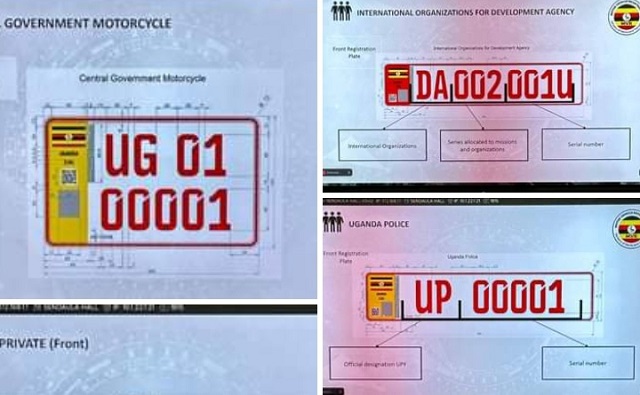In a bid to enhance road safety and combat vehicle-related crimes, Uganda has embarked on a transformative journey with the introduction of digital number plates under the Intelligent Transport Monitoring System (ITMS) project . This innovative approach promises to not only modernize the country’s auto mobile registration system but also contribute to increased security and efficient traffic management. In this article, we will explore the significance of these digital number plates, how they work, their potential to curb crime, their importance, and some challenges they may pose.

Understanding Uganda’s Digital Number Plates
Uganda’s new digital number plates represent a significant shift from the traditional alphanumeric license plates that have been in use for decades. These modern plates incorporate cutting-edge technology, making them more than just identification marks for vehicles. They are embedded with Radio-Frequency Identification (RFID) chips and QR codes, which contain crucial information about the vehicle and its owner. These features ensure that the plates can be traced and are not easily counterfeited, which can aid in crime prevention.
The ITMS project aims to discourage reckless driving through constant monitoring using a network of CCTV cameras. In cordination with the earlier installed CCTV cameras, the system will facilitate point-to-point communication between the national command center and officers on the ground. Through the Ministry of Works and Transport together with the Ministry of Security, the government has agreed a 10-year deal with a Russian tech company, Joint Stock Company Global Security, to install digital tracking chips in all automobile number plates registered in the country
How They Work
The digital number plates operate on a sophisticated system. Each plate is equipped with an RFID chip that stores information such as the vehicle’s registration details, owner’s information, and any relevant data. These plates also have a QR code that can be scanned using a smartphone app developed by the issuing company. This allows law enforcement agencies and other authorized personnel to verify a vehicle’s authenticity quickly.
Major significance
One of the primary objectives of implementing digital number plates is to curb vehicle-related crimes. Stolen vehicles and carjackings have been persistent issues in Uganda, and these new plates aim to address these problems. The RFID technology can provide real-time tracking of vehicles, making it easier to locate stolen cars. This could deter potential criminals and help authorities recover stolen vehicles more efficiently.
Moreover, the digital plates can aid in reducing traffic violations. The security code on the plates allows for quick verification of vehicle details, helping law enforcement officers to identify unregistered or uninsured vehicles on the road easily. This can lead to improved traffic management, reducing accidents and ensuring that all vehicles on the road are legally registered.

Vital implications:
- Enhanced Security: Digital number plates make it much harder for criminals to counterfeit or manipulate license plates, ultimately decreasing vehicle-related crimes.
- Efficient Traffic Management: The real-time tracking capabilities can help reduce traffic violations, improve road safety, and streamline traffic management.
- Improved Revenue Collection: With a more robust system in place, the government can better monitor and collect vehicle-related taxes and fees.
- Modernization: This initiative aligns Uganda with the digital age, showcasing the country’s commitment to technological advancement.
Cons and Challenges
While the adoption of digital number plates is undoubtedly a step in the right direction, there are some challenges to consider:
Cost: The installation of these high-tech plates can be expensive for vehicle owners, which may pose a financial burden, particularly for low-income individuals. According to the ministry of Works and Transport , new vehicle and motorcycle owners would pay Shs 714,000 for the digital number plates, while already registered users will be required to pay Shs 150,000 and Shs 50,000 for vehicles and motorcycles, respectively. To many, this could seem costly.
Technological Infrastructure: The success of this system relies on robust technological infrastructure, which may not be evenly distributed across the country. This makes the technology urban suiting.
Privacy Concerns: The data stored on these plates may raise privacy concerns if not adequately protected, as unauthorized access to this information could lead to misuse.
What to Expect
As Uganda’s digital number plates become more widely adopted, citizens can expect:
Improved Security: Reduced car thefts and increased safety on the roads due to enhanced traffic management.
Increased Government Revenue: More efficient collection of vehicle-related taxes and fees.
Potential Technological Advancements: Over time, the system may evolve to include more features, such as toll collection and automated traffic enforcement.
Uganda’s new digital number plates represent a significant leap forward in vehicle identification and road safety. While they hold great promise in reducing vehicle-related crimes and improving traffic management, challenges such as cost and privacy concerns must be addressed. As the system becomes more widely adopted and technology continues to advance, Uganda can look forward to safer roads and a more efficient vehicle registration process. The digital number plates are not only going to change the way vehicles are identified; they are also shaping the future of transportation and security in the country.
About Memoir Uganda – Showcasing Uganda
We are a comprehensive tourism and travel media company unleashing information about Uganda. We offer, among others, an all-inclusive guide on everything Uganda such as itineraries, consular information, timely and updated tour and travel news and general information about visiting and living in Uganda.
To us, Uganda is more than a tour destination. It is our homeland. Our knowledge about Uganda is ocean deep and we love showing the country’s splendid beauty to the world. We aim at sharing and showcasing Uganda to the tiniest bit, better than anyone else. We also aim at conserving our home land through our un wavered efforts towards climate change awareness.
Our Memoir Uganda magazine showcases Uganda’s diverse potential in detail that is often left out and unknown. You ought never to miss a copy. We robustly believe that traveling should make the world a better place for everyone.





